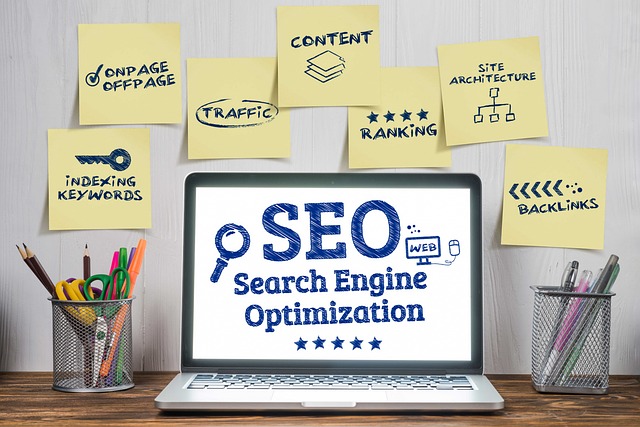AI SEO Training is revolutionizing modern search engine optimization by enabling professionals to create personalized content based on user behavior and preferences. Leveraging artificial intelligence, marketers can analyze vast data, predict user intent, optimize rankings, and deliver hyper-relevant content. This evolution enhances user engagement, ensures adaptability for each unique visitor, and provides a significant advantage over traditional, generic methods. AI algorithms transform keyword research, content creation, and on-page SEO practices, resulting in improved click-through rates, reduced bounce rates, and higher search engine rankings. By integrating AI into SEO workflows, businesses can boost online visibility, drive organic traffic, and achieve impressive growth while maintaining ethical standards and user privacy.
In today’s digital landscape, personalization is key to dominating search engine results. Enter AI, transforming SEO strategies with its predictive prowess and data-driven insights. This article delves into the rise of AI SEO training, exploring how artificial intelligence enhances keyword research, content creation, user experience optimization, and on-page techniques. From ethical considerations to successful case studies, we’ll guide you through implementing AI for a powerful and personalized SEO strategy.
Understanding Personalization in SEO: The Rise of AI-Driven Strategies

In today’s digital era, personalization has emerged as a game-changer in Search Engine Optimization (SEO). Understanding user behavior and tailoring content to individual preferences is no longer an option but a necessity. AI SEO Training has been at the forefront of this revolution, enabling professionals to create dynamic, personalized experiences for their audiences. By leveraging artificial intelligence, marketers can now analyze vast amounts of data to predict user intent, optimize search rankings, and deliver hyper-relevant content.
The rise of AI-driven strategies in SEO marks a significant shift from traditional, one-size-fits-all approaches. This evolution is reshaping the landscape, fostering more effective navigation and enhancing user engagement. With AI at its core, SEO practices can now adapt and learn from user interactions, ensuring that content remains fresh, relevant, and optimized for each unique visitor.
How AI Enhances Keyword Research and Content Creation

Artificial Intelligence (AI) has transformed keyword research, enabling marketers to go beyond traditional methods and delve into more sophisticated analysis. With AI-powered tools, researchers can explore vast amounts of data to uncover hidden keywords and long-tail phrases that were once hard to discover. These tools use machine learning algorithms to understand user search intent, identify trends, and predict future searches, ensuring content stays relevant and up-to-date. By providing insights into user behavior, AI optimizes keyword selection for better rankings.
In content creation, AI acts as a powerful assistant, generating personalized and engaging material tailored to individual user preferences. Natural Language Processing (NLP) allows AI models to understand context, allowing them to create unique and varied content while adhering to SEO best practices. This not only saves time but also ensures that the written material is optimized for search engines, increasing the chances of higher rankings and improved visibility online. AI SEO Training can equip professionals with these skills, enabling them to harness the potential of AI in enhancing their content strategies.
Optimizing User Experience with AI-Based Recommendations

In today’s digital landscape, Personalization SEO with AI is transforming how businesses connect with their audiences. One of the most impactful areas is user experience optimization through AI-driven recommendations. By leveraging AI SEO Training, companies can analyze vast amounts of user data to understand individual preferences and behaviors. This deep insight allows for highly tailored content delivery, ensuring each visitor receives a personalized journey that aligns with their unique interests.
AI algorithms can learn from user interactions, such as click patterns, time spent on pages, and purchase history (if applicable), to generate smart suggestions. These recommendations not only enhance engagement but also improve conversion rates by offering relevant products or content at the exact moment users are most receptive. Thus, AI-based recommendations provide a competitive edge, fostering stronger user relationships and driving business growth in an increasingly crowded online market.
Leveraging Machine Learning for On-Page SEO Techniques

Machine Learning (ML) has become a powerful tool in the arsenal of AI SEO training programs, revolutionizing on-page SEO techniques. By leveraging ML algorithms, search engine optimization professionals can now analyze vast amounts of data to understand user behavior and preferences better. This enables them to create highly personalized content that not only ranks higher but also resonates with individual users.
With ML, on-page optimizations like title tags, meta descriptions, and header structures can be tailored to specific keywords and user queries. These algorithms can identify patterns in search data, allowing for dynamic content generation that improves click-through rates and reduces bounce rates. As a result, websites become more engaging and relevant, leading to better search engine rankings over time.
Data-Driven Content Personalization: A Step-by-Step Guide

In today’s digital landscape, data-driven content personalization is a game-changer for any business aiming to excel in AI SEO training. The process begins with gathering and analyzing vast amounts of user data, including browsing behavior, search history, and interaction patterns. This rich information enables marketers to create highly tailored content that resonates with individual preferences. By leveraging AI algorithms, businesses can automatically generate personalized content recommendations, ensuring each customer receives a unique and relevant experience.
A step-by-step guide to implementing this strategy involves first establishing clear user personas based on data insights. Next, segment your audience into distinct groups based on shared characteristics. This segmentation allows for the creation of targeted content modules that cater to specific interests and needs. As you refine these strategies, continuously monitor user engagement metrics and adjust content accordingly. Regular AI SEO training and updates ensure your personalization efforts stay cutting-edge and effective in a dynamic digital environment.
Ethical Considerations in AI SEO Implementation

As AI continues to transform SEO practices, ethical considerations become increasingly vital. The implementation of AI in search engine optimization (AI SEO) presents both opportunities and challenges regarding user privacy, data security, and transparency. With AI algorithms analyzing vast amounts of data to personalize content, it’s crucial to ensure user information remains protected and used responsibly. One key aspect is obtaining informed consent, especially when using machine learning models that adapt content based on individual browsing behavior.
AI SEO training programs should emphasize the importance of ethical guidelines, such as providing users with control over their data and ensuring algorithmic biases are mitigated. Developers and marketers must be accountable for the potential impact of AI technologies on user experience and online privacy. Adhering to these principles will foster trust and ensure that AI-driven SEO benefits both businesses and consumers in a fair and transparent manner.
Case Studies: Successful AI SEO Campaigns and Their Impact

In recent years, several businesses have harnessed the power of Artificial Intelligence (AI) to revolutionize their Search Engine Optimization (SEO) strategies, achieving remarkable results. These case studies showcase the potential of AI in enhancing online visibility and driving organic traffic. For instance, a leading e-commerce company utilized AI algorithms to analyze customer behavior and preferences, enabling them to personalize content and product recommendations. This approach led to a significant increase in user engagement and conversion rates, proving that AI can effectively cater to individual needs.
Another successful story involves an online media platform that implemented AI SEO training for its content creation process. By employing natural language processing (NLP) techniques, the platform optimized its articles, making them more reader-friendly and search engine-friendly. This resulted in improved rankings on major search engines, increasing organic reach and attracting a broader audience. These examples highlight how AI SEO campaigns can not only boost website performance but also create a personalized experience for users, ultimately driving business growth.
Integrating AI into Your SEO Workflow: Tools and Resources

Integrating Artificial Intelligence (AI) into your Search Engine Optimization (SEO) workflow can significantly enhance efficiency and effectiveness. There are numerous tools and resources available that cater to various aspects of SEO, from keyword research to content creation. AI SEO Training platforms offer comprehensive courses designed to equip marketers with the skills needed to leverage these technologies. These platforms often provide step-by-step guides, real-world case studies, and hands-on exercises, ensuring users gain practical experience in implementing AI strategies.
By utilizing AI tools, you can automate repetitive tasks, such as competitor analysis and link building monitoring, allowing for more time to focus on strategic planning. Natural Language Processing (NLP) algorithms enable advanced content personalization, while machine learning models predict user behavior, optimizing your site’s structure and content delivery. Moreover, AI-driven analytics provides valuable insights, helping you refine your SEO approach based on data-driven decisions.
Future Trends: AI's Role in Shaping the Next Generation of SEO

As we move forward into an increasingly digital future, Artificial Intelligence (AI) is poised to revolutionize the landscape of Search Engine Optimization (SEO). The next generation of SEO will be heavily influenced by AI technologies, which offer both opportunities and challenges for marketers and businesses. Advanced AI algorithms can analyze vast amounts of data to predict user behavior and search trends, enabling more accurate content personalization and improved keyword research. This predictive capability allows for the creation of hyper-relevant, tailored content that resonates with individual users, enhancing their online experience.
AI SEO Training will become essential as the role of AI in optimization evolves. Marketers need to stay ahead of the curve by understanding how to leverage machine learning models for content optimization, natural language processing for semantic searches, and automated tools for efficient link building and analytics. Staying informed about these trends ensures businesses can adapt their strategies to remain competitive in a rapidly changing digital environment.
